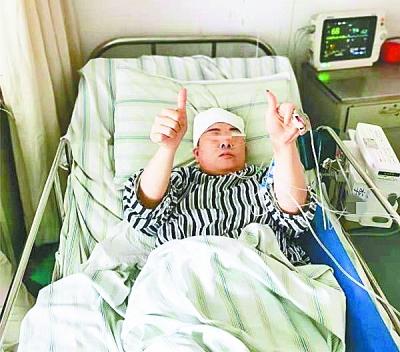After shopping for food
, she had a
severe headache and found an aneurysm. After the
operation, she was awake and gave the doctor a thumbs up.
Ms. Li praised the medical staff after the operation.
Photo courtesy of the hospital
Wuhan Evening News (correspondent Zhou Qishu and reporter Yan Ting) "Doctor, I would like to give you a thumbs up!" On the morning of June 24, in the neurosurgery ward of Wuhan Wuchang Hospital, 46-year-old Ms. Li confronted Yu Jun Wushu, director of neurosurgery Thumbs up.
Thinking of the experience 11 days ago, Ms. Li is still fresh in her memory.
On June 13, Ms. Li, who had just returned home from a grocery shopping trip, suddenly felt severe pain in her head. She was then sent to the emergency department of Wuchang Hospital by her family for treatment.
The result of CTA (angiography) showed that Ms. Li had intracranial subarachnoid hemorrhage, and the cause of her bleeding was a lobular aneurysm in her right brain.
The neck of an aneurysm is located exactly at the bifurcation of several blood vessels, and the neck of the aneurysm is wide and irregular.
The emergency department quickly contacted the neurosurgery department to further treat Ms. Li.
Yu Junwu, director of the Department of Neurosurgery of Wuchang Hospital of Wuchang City, learned of this situation and considered that the tumor may rupture at any time. If the tumor ruptures, it may be life-threatening.
After discussing with his family, Yu Junwu decided to perform a craniotomy for the aneurysm clipping operation for Ms. Li.
More than an hour later, Ms. Li, who successfully underwent the craniotomy for clipping the aneurysm, was sent to the ICU for observation and treatment.
The next day, after being awake, Ms. Li was sent back to the general ward to continue treatment after her physical condition was assessed.
Yu Junwu said that with the increase in temperature, neurosurgery has admitted many patients with sudden cerebral hemorrhage. Before the onset, most patients have moved from the hot outdoors to the air-conditioned room. This is actually the cause of the cerebral hemorrhage. one.
Yu Junwu explained that the blood vessels will relax in a hot outdoor environment, and once they enter an air-conditioned room with a low temperature, the blood vessels will constrict and blood pressure will rise. If the blood vessels have underlying diseases, such as aneurysms or atherosclerosis, the blood vessel walls will be damaged. It will rupture and bleed, leading to a stroke.
Yu Junwu reminded that although it is midsummer, you should not be too greedy for coolness. Too low room temperature is bad for blood vessels, especially for patients with underlying diseases. Be sure to adjust the air conditioner to a suitable temperature to keep blood pressure stable.

